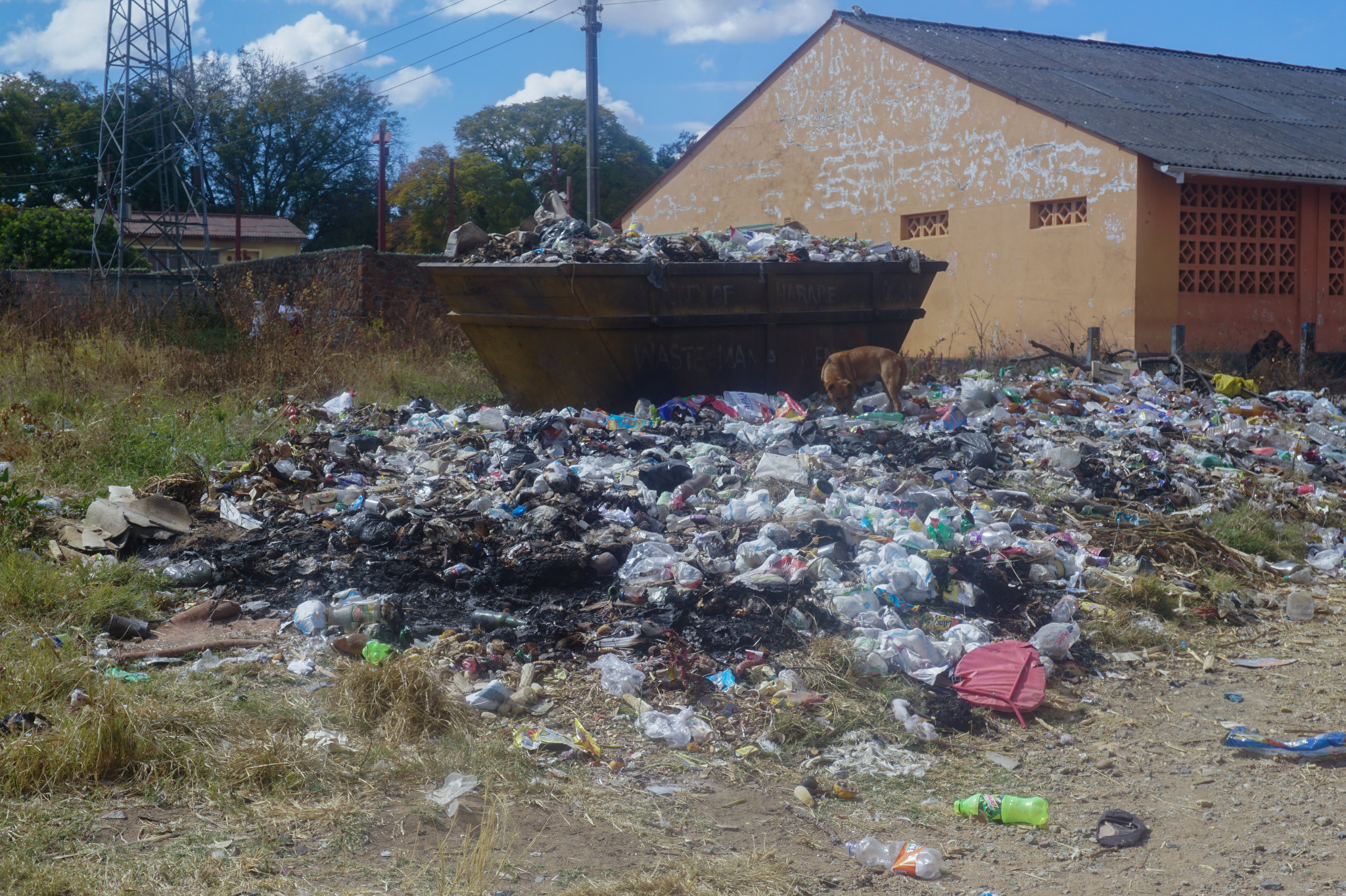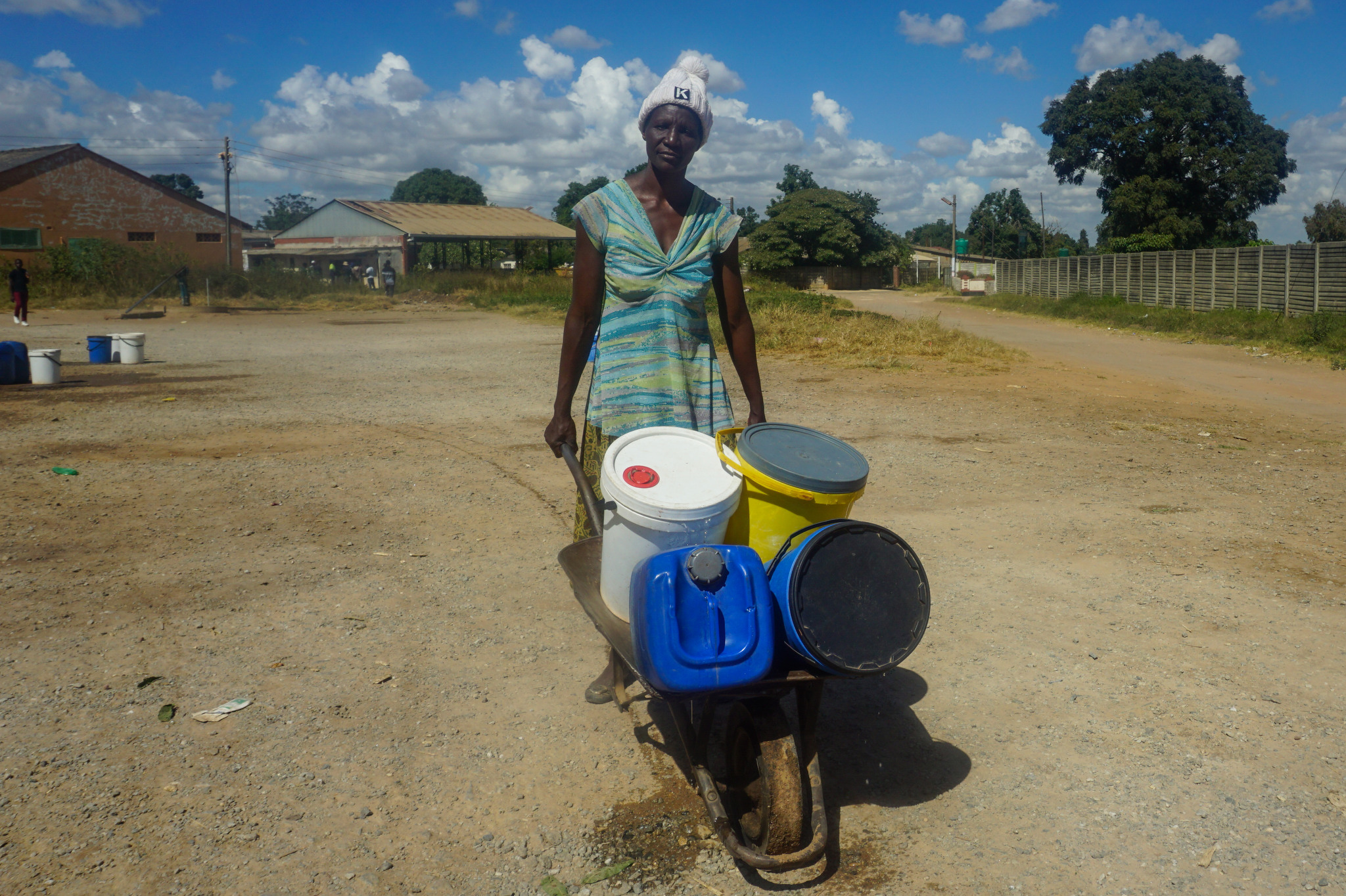
Vimbai Chinembiri, GPJ Zimbabwe
Lindiwe Tsikwa carries water from her well. She dug her own well because of the unreliable water supply in Mabvuku, a suburb east of Harare.
HARARE, ZIMBABWE — In the suburb of Mabvuku, east of Harare, the nation’s capital, Sunday and Monday are water days. Jean Chizimba wakes up at 5 a.m., walks to the tap outside her brick home and turns the valve counterclockwise. Sometimes water trickles out. Sometimes it doesn’t.
Chizimba pays about 2,500 Zimbabwean dollars (ZWL) ($25) each month for, at best, erratic service. On dry-spigot days, she must go to the local health clinic, which has a reliable water supply. She can bring home about four buckets for free — barely enough for her family of five to bathe and flush the toilet until the next water day. “Imagine being on your period and there’s no water coming out of the tap,” says Chizimba, a 42-year-old vegetable vendor. “How do you even maintain cleanliness?”
In Zimbabwe, the central government plays a role in urban water delivery and garbage pickup. The system is widely derided. According to the research network Afrobarometer, 62% of Zimbabweans say that “the government is doing a poor job of providing water and sanitation services” — a number that’s held steady for a decade.
Community groups say there’s a clear fix: devolution, or transferring some central government powers to Zimbabwe’s 10 provinces. That could improve the quality of schools, clinics, roads and water, advocates say, and help hold officials accountable for poor service. “Devolution is when citizens begin to exercise the powers of the state,” says James Chidakwa, who represents Mabvuku in Parliament.
The move comes amid a growing global distrust of government. Exactly a year ago, protesters invaded the United States Capitol to try to thwart the results of a democratic election.



Zimbabwe’s 2013 constitution specifically calls for a “devolution of power and responsibilities to lower tiers of government.” At the time, local control was viewed as more than a way to improve services, according to an article by ZimFact, an independent fact-checking site. After a contested election a few years before and the formation of a unity government with two parties splitting power, devolution was key to “deepening democracy” and “promoting national integration and peace.”
Zimbabwe has taken some steps toward empowering local officials. Last year, the central government set aside 19.5 billion ZWL ($184 million) in “devolution funds” to help provinces improve health care, education and water delivery. However, the government hasn’t set up the councils that were supposed to oversee the transfer process, so most of the money hasn’t been distributed.
The 2022 budget allocates 42.5 billion ZWL ($391 million) to devolution, more than double last year’s amount.
Under pressure from community groups, lawmakers recently introduced a bill that would establish the oversight councils, but Parliament has yet to act on it. Zvinechimwe Churu, permanent secretary in the Ministry of Local Government and Public Works, waves off criticism that officials are procrastinating. “The government has demonstrated strong commitment to devolution and decentralisation,” he says in a statement. Nevertheless, Churu cautions against viewing local control as a panacea for water and sanitation problems — there are too many factors involved in improving service delivery, including funding and infrastructure.
Hardlife Mudzingwa, founder of the environmental advocacy group Community Water Alliance, raises a different issue. He says the bill doesn’t go far enough in changing the current system, as provinces still would report to the central government. “Devolution is about revisiting the whole architecture of the state and therefore cannot be addressed by one piece of legislation,” he says.



Mudzingwa and other activists have taken their message to social media. Under the Twitter hashtag #3Dcampaign — for devolve, develop and deliver — Zimbabweans have posted pictures of a disintegrating road and called for local control of vehicle licensing, liquor licensing, passport applications and taxi permits.
At stake are vital services. Take water: Less than a third of Zimbabwean households have access to an unlimited clean supply, according to a 2018 report by the United Nations Children’s Fund, known as UNICEF. Outbreaks of cholera and typhoid — water-borne diseases — have grown more common.
As in many African nations, Zimbabwe’s National Water Authority oversees the country’s water. In the Harare area, which includes Mabvuku, the water authority only provides water, while the city treats and distributes it, says water authority spokeswoman Marjorie Munyonga. But the amount of water is insufficient, she says, a problem the water authority is trying to fix by building a dam.
Mabvuku residents say supply is not the only hitch: Beneath the water authority are a strata of water councils and sub-councils; complaints often disappear into the byzantine system. If devolution shifted more power to local officials, residents say, they would know exactly whom to call when their taps are dry. Instead, they must fix their problems themselves.



Mabvuku hasn’t had reliable water service for almost two decades, Chizimba says. Years ago, that meant waking at 2 a.m. to queue at the health clinic — sometimes for as long as eight hours. “There were strong men who would control the queues, and there would be a lot of fights at the borehole,” says neighbor Lindiwe Tsikwa, a 36-year-old mother of two. “It became unsafe for us.”
Around 2008, Tsikwa devised her own solution: she sunk a well in her front yard. “The only issue has been trying to make sure our children don’t fall into it,” she says. “But now they are grown up and know not to play close to the well area.”
Yet there’s little Tsikwa can do about the trash mound. As of June, officials hadn’t collected Mabvuku’s garbage for months. Used diapers and sanitary pads tumbled out of a bin and littered the ground; a stench hung in the air. “It’s really unsafe,” she says.
Meanwhile, every morning, Abigail Mizha rises at 5 and hauls a wheelbarrow full of buckets to the borehole. This is her livelihood: filling buckets, slogging back to town, delivering water to her customers. The 42-year-old makes nine water runs a day. Residents gladly pay for her services — they say she’s more reliable than the government.
Vimbai Chinembiri is a Global Press Journal reporter based in Zvishavane, Zimbabwe.
TRANSLATION NOTE
Vimbai Chinembiri, GPJ, translated some interviews from Shona.






